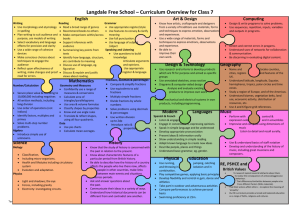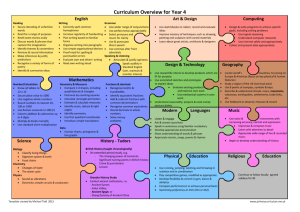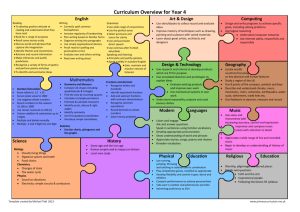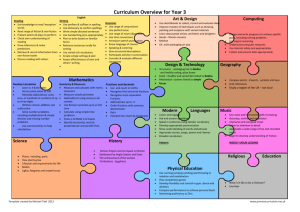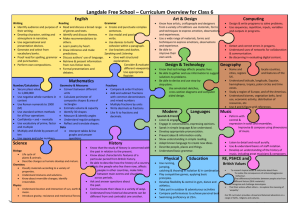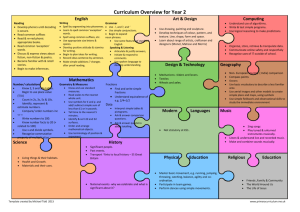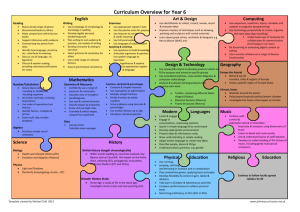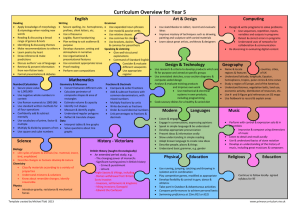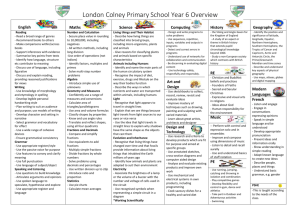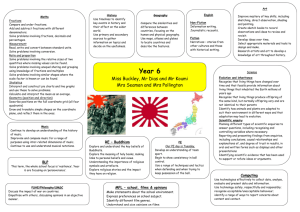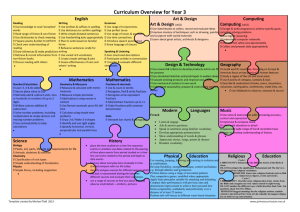Class 5
advertisement
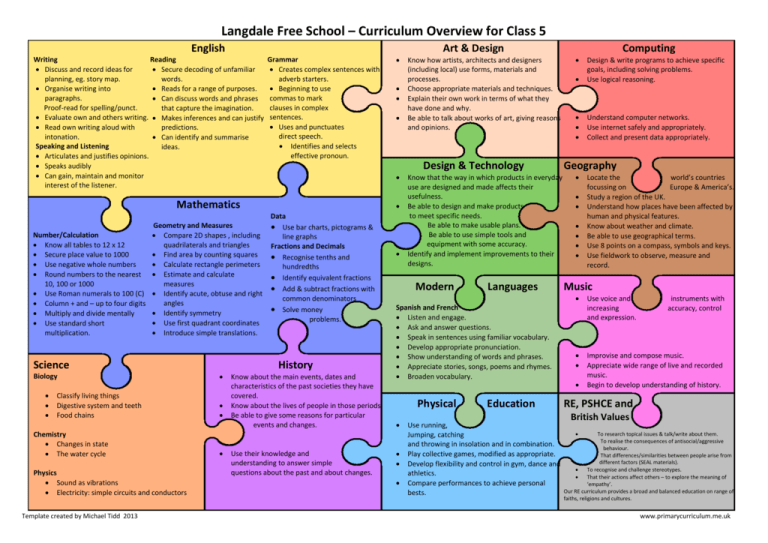
Langdale Free School – Curriculum Overview for Class 5 English Art & Design Writing Reading Discuss and record ideas for Secure decoding of unfamiliar planning, eg. story map. words. Organise writing into Reads for a range of purposes. paragraphs. Can discuss words and phrases Proof-read for spelling/punct. that capture the imagination. Evaluate own and others writing. Makes inferences and can justify Read own writing aloud with predictions. intonation. Can identify and summarise Speaking and Listening ideas. Articulates and justifies opinions. Speaks audibly Can gain, maintain and monitor interest of the listener. Grammar Creates complex sentences with adverb starters. Beginning to use commas to mark clauses in complex sentences. Uses and punctuates direct speech. Identifies and selects effective pronoun. Science Classify living things Digestive system and teeth Food chains Chemistry Changes in state The water cycle Physics Sound as vibrations Electricity: simple circuits and conductors Template created by Michael Tidd 2013 Data Use bar charts, pictograms & line graphs Fractions and Decimals Recognise tenths and hundredths Identify equivalent fractions Add & subtract fractions with common denominators Solve money problems. History Biology Know how artists, architects and designers (including local) use forms, materials and processes. Choose appropriate materials and techniques. Explain their own work in terms of what they have done and why. Be able to talk about works of art, giving reasons and opinions. Design & Technology Mathematics Geometry and Measures Number/Calculation Compare 2D shapes , including Know all tables to 12 x 12 quadrilaterals and triangles Secure place value to 1000 Find area by counting squares Use negative whole numbers Calculate rectangle perimeters Round numbers to the nearest Estimate and calculate 10, 100 or 1000 measures Use Roman numerals to 100 (C) Identify acute, obtuse and right angles Column + and – up to four digits Identify symmetry Multiply and divide mentally Use first quadrant coordinates Use standard short multiplication. Introduce simple translations. Know about the main events, dates and characteristics of the past societies they have covered. Know about the lives of people in those periods. Be able to give some reasons for particular events and changes. Use their knowledge and understanding to answer simple questions about the past and about changes. Know that the way in which products in everyday use are designed and made affects their usefulness. Be able to design and make products to meet specific needs. Be able to make usable plans. Be able to use simple tools and equipment with some accuracy. Identify and implement improvements to their designs. Modern Languages Spanish and French Listen and engage. Ask and answer questions. Speak in sentences using familiar vocabulary. Develop appropriate pronunciation. Show understanding of words and phrases. Appreciate stories, songs, poems and rhymes. Broaden vocabulary. Physical Education Use running, Jumping, catching and throwing in insolation and in combination. Play collective games, modified as appropriate. Develop flexibility and control in gym, dance and athletics. Compare performances to achieve personal bests. Computing Design & write programs to achieve specific goals, including solving problems. Use logical reasoning. Understand computer networks. Use internet safely and appropriately. Collect and present data appropriately. Geography Locate the world’s countries focussing on Europe & America’s. Study a region of the UK. Understand how places have been affected by human and physical features. Know about weather and climate. Be able to use geographical terms. Use 8 points on a compass, symbols and keys. Use fieldwork to observe, measure and record. Music Use voice and increasing and expression. Improvise and compose music. Appreciate wide range of live and recorded music. Begin to develop understanding of history. instruments with accuracy, control RE, PSHCE and British Values To research topical issues & talk/write about them. To realise the consequences of antisocial/aggressive behaviour. That differences/similarities between people arise from different factors (SEAL materials). To recognise and challenge stereotypes. That their actions affect others – to explore the meaning of ‘empathy’. Our RE curriculum provides a broad and balanced education on range of faiths, religions and cultures. www.primarycurriculum.me.uk Template created by Michael Tidd 2013 www.primarycurriculum.me.uk
